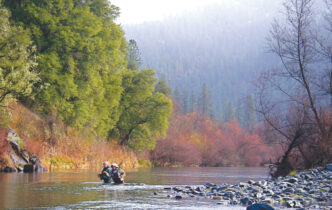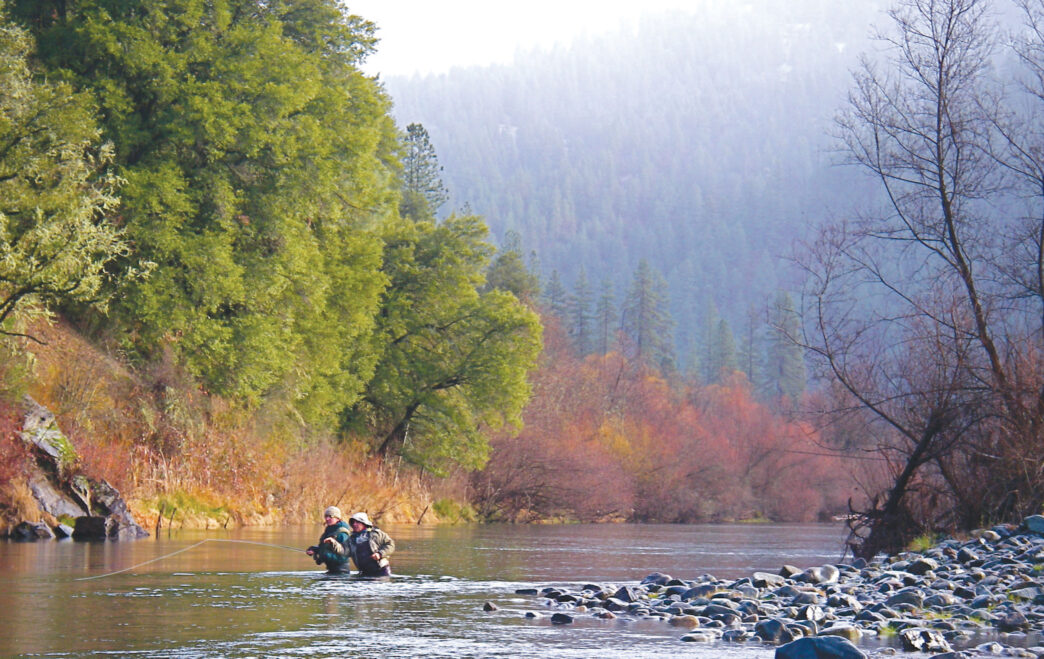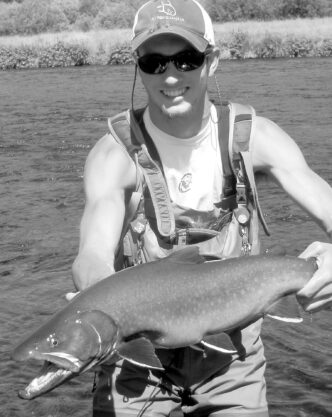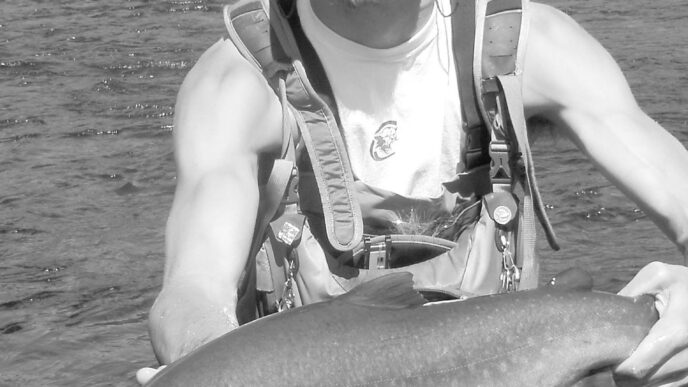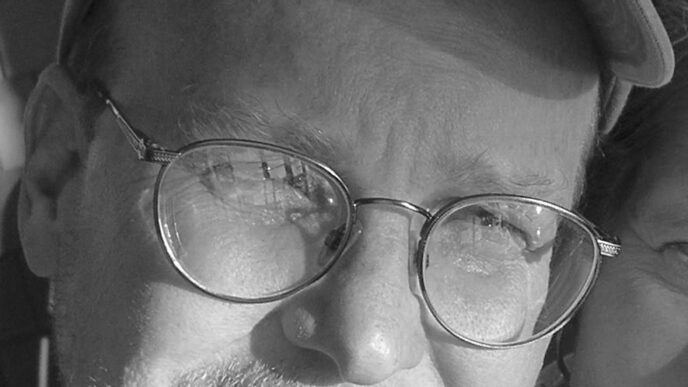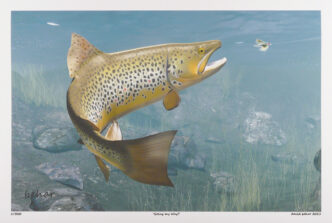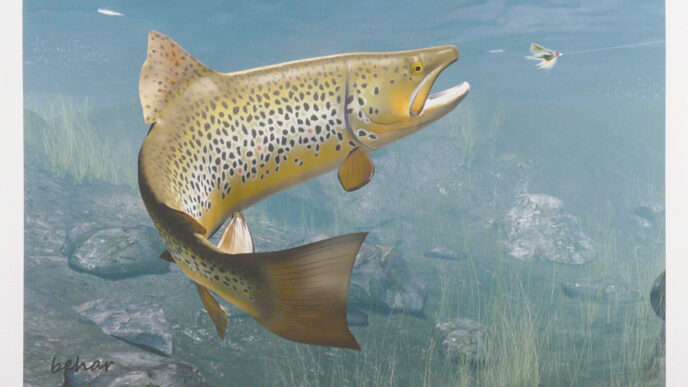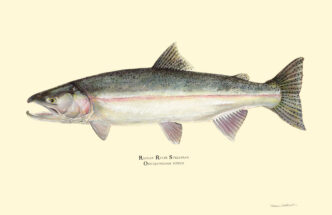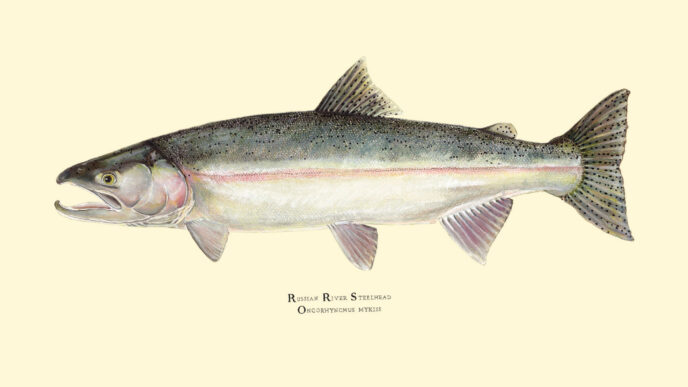Number 10: The Universe Responds!
It’s early May, and I’m standing on the banks of Lake Nicasio in Marin County. There’s a very bassy-looking finger of flooded grass and brush just out of casting range, and if I could only wade out there fifteen or twenty feet, it could be interesting. But no. In the mighty Marin Municipal Water District, beasts of the field and fowls of the air can do whatever they want in watershed impoundments, but “human contact” with the precious waters is strictly forbidden. Apparently cow dung and cormorant crap are acceptable in MMWD reservoirs, but my old Nikes just ruin the bouquet. Oh, Marin, Marin . . .
I decide to go for it. A ghosting of Scottish Confederate ancestry rises up and smites all fears and considerations, and I step in. If they nail me, let me be nailed to the cross of righteous indignation and wet wading! I strip line and start firing off angry casts.
Suddenly, there are sirens on the nearby road and the cyclonic roar of a helicopter overhead. Just behind me, where my truck sits in a pullout, a pair of CHP cruisers sweep in and slide to a vicious halt. I look up, and the chopper is directly overhead. Some guy is leaning out with a camera, waving at the Highway Patrol officers, who have climbed from their cruisers and are now just on the other side of the willows. I have never felt so utterly busted in my life, although at the same time this is so impressive that a sort of giddiness arises from the sheer pageantry of it all. What Marin lacks in perspective, it sure makes up for in overkill, and I reel in and exit the lake, dripping and grinning idiotically, cooking some clever one-liner for the CHP.
The officers seem surprised to see me emerging from the willows. They look me up and down, but appear curiously bored. “How’s fishing?” one asks. “A little . . . uh, noisy,” I shout, clipping off my Woolly Bugger and preparing to face whatever music is about to play. The officers nod and turn back toward the road. I stand there, waiting. The chopper hovers overhead. The cruiser’s lights flash and turn. It’s a long moment.
“So what’s going on?” I venture finally.
“Oh, it’s just the Lucasfilm guys,” one officer says. “They’re shooting today and needed the road shut down for an hour.” He looks at my soaked shorts and frowns. “You need to get out of here or something?”
“No, I’m good, I’m good!” I retreat laughing into the willows, retying the fly and wading back in. O, Marin!
Number 9: Two Kinds of Luck . . .
A crisp October morning on the Truckee, my first day ever on these fine waters. Not knowing a thing about the river, I start with the basics, short-line nymphing a Golden Stone through the head of a plunge pool, and on about my fifth or sixth drift, something substantial takes. Very. This one heads downstream so fast I’m temporarily hypnotized by the spinning crank handle and watch bemusedly as the backing appears. Coming to, it occurs to me it might be a good idea to actually play the fish. But too late. The second I raise up to apply brakes, the line stops solid . . . too solid . . . and I’m hung. After the obligatory tugs and jiggles, I surrender and break off. And a bonus, not only is the fish gone, but my fly line as well, courtesy of a failed nail knot.
I’ve now been fishing the Truckee for all of twenty minutes and it’s time to head back to town for a new line, having left my main tackle bag at the condo. I pause to utter the appropriate four-letter benedictions and begin a long hike downstream to my truck.
As I wade across a shallow run to the roadside of the river, something hangs on my boot and nearly trips me. I’m thinking ancient barbed wire, but when I look, it’s some odd, blueish-colored vine or weed. Then I recognize the color: my fly line, coming downriver to meet me!
Way cool. Nothing wrong with that other kind of luck, is there? I start to gather back in my wandering weight-forward and . . . you know the rest. The trout (a fat and lovely twenty-one-inch brown) is still attached and preplayed out, having worn himself down dragging ninety feet of 6weight line around. He comes in docile and resigned, hand over hand, and I swear I hear him sigh as I free the hook and let him swim.
Number 8: … and a Third Kind
Hiking back from the far end of the Conservancy section of the McCloud on a blazing August afternoon. I’ve had a great morning, better than I deserve. The Mac is not an easy river, especially in late summer, but today, she has lain down like a kitten. and I am in a rare state, touched by grace and fisher’s euphoria. In fact, I’m just about to burst into an aria from The Who’s Tommy when I pop out of the trees onto a ledge above a granite shelf by one of the major pools. My career as Roger Daltrey’s understudy is cut mercifully short, and I’m stopped stiff by what I see. Down on the shelf, stretched out like the Elysian Plains, is an absolutely gorgeous blonde, topless, bottomless, and in full holy Toledo. Tanning lotion and a water bottle sit nearby, I notice . . . eventually.
It’s one of those moments the brain simply can’t process, so completely at odds with the flow of assumptions and past experience and all that’s known as true. For a few shining seconds, I find myself completely free, relieved of commonsense and reality. No aria required!
Then my brain rejoins the party. The thousand-mile stare is broken, and I start looking around. Beautiful women, I learned long ago, are much like bear cubs: someone usually has their backs, and you better keep your head on a swivel. And there he is, a large, athletic-looking sort standing in some impressively fast water a couple hundred yards upstream. Diplomacy is required here, says the mind, reasserting itself.
The geography of the trail is such that I have no choice but to continue along the ledge, in full view of the Goddess. I lock eyes on my boots and began to pick along with profound courtesy and discretion, pausing only for a last look before the trail plunges back into the trees. Some impressions are not likely to come again in this life, so one is allowed to appreciate. Fortunately, the whitewater roar at the pool’s head covers for me, and the blonde appears undisturbed.
Upriver, I pass the boyfriend or husband just as he’s exiting the water and climbing back on the trail.
“Hi there!” he greets. “Doing any good?”
“Oh hell yeah!” I sing out with a wave. I don’t stop to go into the details, where both God and the Devil reside…
Number 7: One More Blonde Story
When my oldest daughter was seven, I decided to take her camping, just the two of us. Seemed like a good father/daughter bonding opportunity, even though she had never shown much interest in such things, and I firmly resolved (with my wife’s “help”) that the fishing rods would stay in the truck unless Annie herself asked to fish. Nothing between us, nothing to distract Dad from his straw-haired girl. Also, there was the whole bringing-back-thechild-alive thing. I came kind of late to the paternal-instinct game, I guess.
It’s early September, and I decide on the Trinity, where it will still be hot enough to swim and play in the river. Yes, there might be some early fall-run chinooks or steelies, but that’s strictly secondary. Maybe Annie might actually be thrilled by the sight of a fifteen-pound fish jumping the chute at the Hell Hole. It could happen.
After a sweaty, but pleasant drive up the valley — my daughter was always a great traveler — and a series of misfires checking out campgrounds along Highway 299, we finally find ourselves a good little spot just above Big Flat, near the then-famous “50 MPH Hole.” We set up right beside the river, nicely screened in by willows and blackberries, and there’s even a tiny gravel beach of sorts in a shallow back eddy, shielded from the main flow by a huge boulder. It’s very inviting, especially after the long drive, and Annie goes right in, not even taking her shoes off, much less changing into a bathing suit. I give her a long leash on this one. It’s safe enough and . . . and this is what Daddies do when Mom’s not around, right? She plops down gleefully in a foot of water, and the look on her face goes right into memory. Bless her. Such a little trooper, happy to play with a stick and sit in a river in her clothes, trusting and open and knowing nothing bad can happen because she’s with her Dad.
“Catch a fish, Daddy!” Now all smiles and mischief, knowing Daddy pretty well. “Catch one for dinner!”
“Well. Since you put it like that . . .”
So I rig up, although without much expectation. The Trinity doesn’t feel very inhabited to me just now. The early runs are probably still down in the canyon, waiting for rain and trying to get past Burnt Ranch Falls, but I’ve got to try. Someone has spoken.
I climb up on the big sheltering boulder where I can keep an eye on Annie while I fish. Just on the other side, a long half-pipe slides off a shelf and plunges into a deep pool, and there are scraps of old tuna balls and roe sacks on top the rock, where the salmon hunters have been before me. I cast and cast, but it’s too hot, too early in the evening, too “September.” Annie loses interest fast, and I’m not far behind. I shoot one last long cast out into the deep end, let the line run straight, and start to reel in. Just as the leader appears out of the depths, a very, very large brown trout rifles up (is this why it’s called the 50 MPH Hole?) and stops on a dime with his snout on the streamer’s tail. Our eyes connect for an instant before he flashes back into deep water, his tail broader than my hand. So that’s the way it’s going to be, is it?
Then, out of nowhere, for some bizarre, deeply psychological reason I can’t even speculate about, I have an overwhelming urge to jump in the river. From where I stand, I could easily hit that seam, line up with the chute, and ride it down into the deep hole, a pillowy little drop of only three or four feet, like the Log Ride at the Santa Cruz Boardwalk. This thought appeals to me so much, I set the rod down and announce my intentions to Annie.
Again the look on her face is memorable, but what really penetrates the heart is her stricken tone of voice. “Daddy, don’t! Please don’t! What if you get hurt?”
And for the first time in seven years as a father, a simple truth is revealed and silences me inside: My daughter loves me.
Number 6: Classy, Bill. Real Classy
It’s been a very long day, headhunting trophy browns on the McCloud. We’ve been fishing with a man who, at the time, was one of the top guides in Northern California, and he’s pulled out every trick and ad-libbed a few more, but with not much luck. Partly it’s us (we were new to the sport at that time) and partly the lawful hazards when angling for brown trout on the Mac in November, which is far from a sure thing. The only fish we’ve managed has been a sweet eighteen-inch rainbow, caught in a moment of boredom when I abandoned streamers for a while and started tossing a Sofa Pillow around. Still, we’ve been taught a lot, and our guide has tipped us to some things that will take years off the learning curve, so it’s a day well spent.
As we gear down in the early dark at the Conservancy parking lot and prepare to go our separate ways, the mood is genial, despite the lack of success. The time comes for the ceremonial exchange of currency, and I reach in my upper vest pocket for the gratuity I’d put there that morning and, with great sophistication, slip him the twenty with a handshake. We part company, vowing a return the following fall. I get a brief sideways glimpse of our guide, frowning slightly as he gets in his truck, but I can’t blame him, really. Guiding beginners must be a chore, especially if the fish don’t help out, and I’m sure he’s as tired as we are. We hike back to our campsite at peace with all things.
Next morning, we’re down in the canyon above Ah-Di-Na, putting some of that hard-won knowledge to use. At one point, I spot some large shadows in deep water at the base of a cliff and one of our guide’s instructions comes to mind, the one about using an indicator over a streamer to slow down the drift. I fish for the packet of yarn in my vest and pull out . . . a twenty-dollar bill.
After I stare stupidly for a moment, the pieces fall together. The darkness, that smoothly palmed banknote, the guide’s frown . . . good one, Bill. You tipped him your indicator bag.
I can’t help laughing long and hard at the sheer idiocy of it all. When we get back, I’ll send him an apologetic note and the twenty, but right now is the time to bask in folly, glorious folly. How often do you get to be so slam-dunk wrong that there are no excuses, no finger pointing, no denial? Just a clean whiff. Feeling refreshed and alive, the ego scrubbed clean of itself, I get up to go track down my companion, who very wisely held on to his indicators. Sometimes, it’s good to be mistaken.

Number 5: Grace Is Like the Dew
The instant I set up, I know I’m in trouble. The steelhead is into my backing before I can even say “Wow,” and he’s already across the river and “heading for Douglas City,” as they say on the upper Trinity. This is one hot, hot fish, the fastest speedburner I’ve been attached to since tangling with a big jack crevalle in Hawaii. I’m leaning back on the 6-weight and can feel it in the cork, but this is a real torpedo, and there’s only so much one can do with 4X tippet.
So I start to chase him downriver as best I can. Unfortunately, this section has a lot of broken ledges, deep drop-offs, and some fast water and overhanging trees, and even by hugging the bank, I’m able to recover only a little backing. The fly line is way gone and nowhere close to sight. I slip into a hole and take frigid water over the waders, but crawl out before too much damage is done. By then, though, the fish has stopped, and when I pull, I sense line rubbing against something deep and hard out there. Oh well. The steelie has obviously found a slot in the rocks and has wrapped me tight. By the time these fish get into the upper river, they’ve usually been caught a time or two, and I get the clear impression he’s probably done this before. Well, at least there was a hookup and a sleigh ride there for a while.
I hear a clunk upstream and see a drift boat with three guys watching, respectfully holding back from the battle zone. I wave them in.
“Might as well come on by. I’m hung.” The man on the oars nods and starts down the run, and an idea thaws my slowly freezing brain. “Hey, on your way down would you mind seeing if you could unsnag me there?”
I hold the rod high to bring the line as close to the surface as possible, and one of the other guys in the bow waves that he’s got it. Then, before I can even register what I’m seeing, he grins maliciously and leans back with a tremendous yank. I can sense something pop in the water, like the muted sound of a distant femur breaking.
The whole boat laughs, and the man in the bow hoots out: “Well, it’s sure loose now!” “Great. Thanks,” I say, limply. I’m hoping that the fly line at least is still attached and usable, and start reeling slowly in. The backing comes in and, glory be, the fly line is still on board and looks OK! Do I get some leader back, too? I’m thinking something ugly and cynical about it being the week before Christmas and evil elves
and reindeer manure and then the butt section of the leader does indeed appear. I lift up for a look at the business end and up comes the astonished face of the steelhead, still attached. I look at him, and he looks at me for about three-tenths of a second, and then we’re off and running again. Apparently, the fish had bolted to my side of the river to get away from the boat, thinking (as I had) that he’d been broken off. The look on both our faces must have been priceless.
This time, though, I’ve got a better angle on him and more room to move downstream. And he’s a bit tired, what with all the excitement and racing around. Within ten minutes I’ve got him panting in a shallow backwater. I’m shocked at how small he is: four pounds, maybe five, but a wild, hook-jawed male steelhead nonetheless, regarding me with furious eye, living proof that it’s not the size of the dog in the fight, but the size of the fight in the dog. I take a quick, respectful photo and send him on his way. The odds of that barbless nymph having stayed solidly hooked after all that? Can’t even imagine the math.
A dozen years later, I still keep that one photo on my desk, though I’ve caught many bigger fish.
Number 4: It’s the Impressions, Dammit!
It’s the four-hundred-pound black bear grazing berries fifty feet away on the other side of the river when your eyes met and there was an understanding, unspoken, but palpable, some sort of honor among predators that passed between you. It’s the gray fox, his bark like a smoker’s cough, standing his ground on a log not twenty feet away and really pissed off about something . . . maybe it’s you. It’s the trip where, suddenly, there are grouse everywhere, standing right in the trail, dumb as chickens on Prozac, and you literally have to boot them out the way to pass. It’s the nut job who drives his beat-up Chevy down into Deep Creek at two in the morning, honking and howling, looking for a party on one of the most remote reaches of the Pit River. It’s waking up on a full-moon night in a burn zone near Hat Creek and looking out on the eerie, desolate landscape, watching a huge skunk running in circles and figure eights, at full speed and for no apparent reason.
It’s the Milky Way over the East Walker high desert in August and realizing no matter what goes on with us here on Earth, it’s all very, very small. It’s fishing all day in a snowstorm almost to the point of hypothermia, then catching that one fish that saves it all and sends you back to the motel for scotch and a football game, happy, forgiven, overflowing. It’s hearing a thump in the grass behind you and finding a seventeen-inch rainbow, still alive, but bleeding from an osprey’s talons, as the bird circles back over your head and cusses you off his dinner. It’s catching the biggest steelhead of your life on a fifty dollar 5-weight backup rod you were just goofing around with. It’s falling in on your first stream crossing of the morning and having to turn right back around and start over, all the way from underwear.
It’s a Goliath brown that jumped just as you were pulling off the river on the trip’s last evening, snapping an October Caddis out of midair with jaws that popped like a .22 long rifle. It’s sleeping in back of the truck amid a pile of gear, the best sleep you’ve had in a year. It’s hearing something snort in the dark by your camp on the Walker and turning on the flashlight to find a thousand eyes staring at you, a herd of sheep bedded down so noiselessly that you set up camp, cooked dinner, and hit the sack without even realizing there were five hundred animals not a hundred feet away. It’s driving halfway out of a remote, four-wheel-drive-only campground where you haven’t seen another soul in days and having the truck suddenly stop dead, then finding it’s only the battery cable come loose and yes, there is a God. It’s sleeping tentless under the stars and dreaming all night about dogs and waking up to find fox tracks all around your sleeping bag, where you were thoroughly sniffed over during the night.
I could go on. And so could you.
Number 3: Would I Even Recognize the Devil?
Fishing our way back to camp along the middle reach of Pit 4, we run into the only other fisherman we’ve seen all day. The usual middle-of-nowhere greetings and lies about the morning’s luck are exchanged, and in the pause that follows, our new acquaintance sits down abruptly with a sigh and a curse.
“I tell you. This used to be a really great river,” he starts off. Here we go, I think, with a sigh of my own. Another session of “shoulda been here back in the day,” for which I have no patience anymore. This is our time, this is the hand that’s been dealt us . . . and I’ve caught more than twenty nice fish today and don’t really care how it used to be.
“Yeah,” he continues. “Now everyone’s found the place. All the guides and fly shops are selling it. And some SOB even wrote a story about it in that California fly fisher magazine.”
“Really?”
The man fixes me with a grizzled squint and, not missing a beat, begins to quote whole sentences from the offending article, reciting almost entire paragraphs word for word. I know this, because it happens to be a piece I wrote, published only a few months before. Robert and I look at each other and kind of smile, kind of frown. Who is this guy?
“Do I know you?” I interrupt finally. I’m sure I’ve never seen this fellow in my life. He stops narrating and looks away with a sniff. “You know,” Robert chimes in, nodding toward me. “He wrote that article you’re talking about.”
“That so.” There’s no question mark or further comment. The man shrugs and stands and gives us both one last squint before heading upriver. Robert and I sit down for a while, trade headshakes, decide not to touch this one with a sixteen-foot Spey, and then move on . . . move on.
Number 2: Or an Angel?
I’m sitting on my spot, waiting for the evening rise that is just about ready to pop. I’ve planned for a couple years to get back to this place, at this time of year, with just the right flies to nail a hatch that unmanned me the first time. If you’ve ever seen a major Golden Stone event, you know that of which I speak. It gets in your head.
Waiting, waiting, and watching the top of the run where the flies go to drop eggs, I’ve been there about a half hour and haven’t yet made a cast, when an older gentleman suddenly appears out of the trees and stands watching the river. I’m not sure where he came from . . . the road is just behind us, and there was no sound of an incoming vehicle, but he’s so obviously on point that it’s clear he knows what’s about to break loose. Only after a long look at the situation does he even acknowledge that I’m there.
“Mind if I squeeze in here?” he smiles, already moving toward the water. I kind of do mind, but it’s a pretty long run, and there’s room enough, so I shrug and welcome him aboard. He goes directly and surprisingly quickly right to the head, standing in a little fold in the trees, almost invisible among the leaves. I notice a few recently slashed-off limb stubs around his pocket in the brush and, judging by the way he fits so precisely into that space, I realize he’s got himself a long-term business going on this run. From his point of view, I guess, he’s letting me fish his spot. Okay, fair enough.
I’m still waiting to see some heads coming up, some slashes or rolls — something, anything — but the older fellow is already flipping short, crisp little roll casts into the broken water. He’s good, and he’s got my attention. Now it’s not unusual for me to cross paths with people who are much better at fly fishing than I am (and some days, it seems like that’s almost everyone), but there’s something different about this guy. Can’t put a label on it, but I feel like I simply must watch what he’s doing. It’s not even a choice, and the fact that after so much planning and anticipation I’ve completely forgotten about fishing myself evokes a very weird mix of feelings. And what he’s doing is catching fish.
Only two or three casts in, he’s hooked up with a nice ’bow that cartwheels across the river, an eighteen-incher at least. He stands stock still, holding the rod at about 60 degrees, but not moving or making any particular effort to play the fish. He just keeps the rod solid at two o’clock and lets the big trout race around until he’s done, then reels him in and unpins the fly. The whole thing takes maybe a minute and a half, and he’s back to roll casting. I’ve never seen anyone fish with such calm and dispassion. There’s that strange, otherworldly flavor again.
So I start fishing, despite the apparent lack of risers. I need something to do, something to break the spell. A fish would be nice. I’ve got the fly I want, got the drift I want, there are a few bugs starting to come off now . . . all the pieces are in place. But nada, zip, zero. Meanwhile, my neighbor unhooks his fourth trout of the evening. I pick up the pace, casting furiously and not catching fish just as furiously. Finally I hear a voice from the trees.
“Got any Green Drake patterns?” “Drakes? Wasn’t that hatch over two months ago?” I haven’t seen a single Green Drake in three days of hard fishing.
“Yep. That’s what they’re eatin’. Green. Drakes.” He repeats it slowly, making sure I get it. Having nothing at all to lose, I change to a size 12 Drake pattern, although the air is now filled with Golden Stones, caddises, Pale Evening Duns, and a few late-hatching Salmonflies — in short, just about everything except Green Drakes. And on my second drift, I watch as a savage sixteen-inch brown arcs over the water and comes down on my fly like Death from Above. I guess they’re on the Drakes, or the memory of Drakes, or whatever. I catch a couple more decent fish and then pull out, again with mixed feelings. Two years of preconceptions and assumptions and plans crash hard, even if you do catch a few.
The next evening, I’m hiking past the same run and the old guy is there again, entrenched in his little tree pocket, snapping out roll casts. Just downstream, in the exact spot where I’d been fishing the night before, is a new guy, younger than me, but with much more expensive gear and a cigar. His fly rod leans, unused, against a rock as he watches and watches the other man fish. I don’t know what I think or feel, but I go a couple hundred yards upstream to the next pool and flat-out nail it, a dozen trout in less than an hour, nothing under twelve inches.
They’re on the Green Drakes.
Number 1: And Then There Are Days Like This…
It’s our first trip to the East Walker, and we are in love. The first day was a little tentative, getting used to the odd-colored water and thin air, but by midmorning of the second day, we are so dialed in. The early October light helps, bathing all in chardonnay glow. And of course, there’s the romance of the high-desert plateau, something like Castaneda meets High Plains Drifter meets Lee Wulff. The long views, the snow-topped Sierra backdrop, the incredible abundance of wildlife, the massive flocks of sheep driven down from the high country, the sweet, dusty smell of sage, and that overarching strong minor chord of human loneliness and frailty against the scale of so many things larger than us . . . what’s not to love?
And sweet mamacita, the fishing! After experimenting with the usual techniques that first day, we slowly realize it really doesn’t matter and settle for size 6 Woolly Buggers on short, straight leaders, simply because we can machine-gun more casts with less stopping for rigging and less attention to finesse. There’s no pretense to style or repertoire-expanding experimentation, we’re just absolutely hammering fish. We catch trout where they’re supposed to be and where no fish should ever swim. We catch them as we’re wading across riffles, trailing our lines because it’s too much trouble to reel in. We catch them when we overcast into the willows and are trying to shake dangling flies loose. We catch rainbows, browns, cutthroats, Sacramento perch, and some weird whitefish-like thing that outfights them all and that we will never catch again on this river. In short, we can do no wrong, and as we work our way deeper and deeper into the Nevada desert, our focus is honed to laser-grade precision. Casts go into six-inch openings, big-fish pockets are spotted instantly and pillaged, intuition and instinct join with hand and eye, and we are fish-catching machines. It will take us many years to understand that the East Walker is a very cyclical and moody little river and fishes this way only about one year in ten, that we have wandered into a happy accident — a system at the peak of its abundance — but that is not our problem today. Today, there’s nothing but the next bend and what may lay beyond.
At one point, we’re wading across a riffle and a thirteen-inch rainbow scoots out from under our boots, porpoises across shallow water, then leaps and buries himself headfirst in a weed bed. His tail wags pitifully in the air. I walk over and extract him, laughing with Robert as he revives.
“Where are we, man?” I wonder aloud. “What the heck is this place?”
We keep fishing and fishing. It’s late in the day now, but there’s always one more inviting-looking run, one more undercut bank that might have a monster brown, another turn ahead begging to be explored. I haven’t been in a state like this since I was twenty, and that one was chemically assisted. I feel like I’m walking on magic, casting with phosphorescent arms, waving a graphite wand that pulls fish after fish out of the hat. I never want it to stop. Then, as I’m playing yet another nice brown, a coyote the size of a small wolf steps out of the sage and onto the gravel bar, about twenty yards or so downstream. He sits down and watches me land and release the fish, then gets up and disappears back into the scrub. For some reason, this sobers me up, and I realize that it’s dark. Not just getting dark: it’s night, and we are several miles from the truck — several difficult, brush-choked miles, with only the river as a trail. Uh-oh.
I whistle up Robert, and we assess the situation. It’s a daunting prospect. Comparing notes, we find we’ve both used up all our water and day rations and that neither of us has remembered our flashlight. There’s a brief moment of unspoken, silent concern, and then we do the only thing we can do: we start back down the river, taking it slowly, conserving energy, trying to stay calm. Just a long walk on a moonlit October night, nothing more. Interestingly, this approach works just as magically as everything else has that day, all of a piece. It’s even kind of pleasant, enjoying the change along the river as beavers come out and owls go to work and the rest of the night shift gets after it. Coyotes yip across the red-rock hills and there are strange birdcalls passing over us, but we walk in luminescent serenity. My legs start to knot up and cramp toward the end, and my throat gets raw from sucking in dry desert air. I don’t think I’ve ever been so completely, utterly exhausted, but it’s all OK. We’ll get back, and we’ll be fine. And tomorrow, we’ll do it all again. Oh yes, we will do it again . . .



